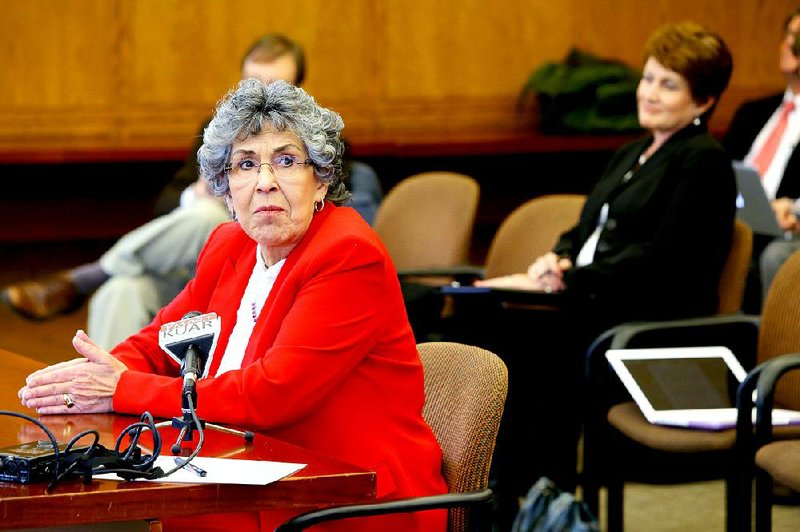With significant pay raises expected for state lawmakers, including a recommended 148 percent increase for legislators, only two citizens appeared before the commission to criticize the proposals to increase pay for state officials.
Two Supreme Court justices also attended and suggested the commission consider even bigger pay raises for the state's top bench.
The Independent Citizens Commission, which has received dozens of emails and letters, many of which were critical of a slate of proposed raises announced Feb. 2, held a forum Monday as part of a public comment period.
While only two objectors spoke critically of the seven-member commission's proposed raises, one Little Rock attorney openly endorsed its findings and the pair of Supreme Court justices urged the commission to consider increasing the salary bumps that were floated for the state's top court.
Scott Minton, a retired Edward Jones investor, said at the onset of the meeting that he was astonished by the small turnout from the state's taxpayers.
Minton said he had talks with about 50 or 60 people about the proposed raises, which include a $53,241 increase for the governor and a $56,868 increase for the attorney general, and that on average, those business owners he surveyed said Arkansans had gotten 2 to 3 percent pay raises over the past five years. Some got none at all.
"The people I talk to, given the general economic condition of people in this area, what they make and what kind of raises they've got, in my judgment, it's not sensible to keep increasing government pay," Minton said. "It's not fair and it does not make sense."
Whereas Minton appeared disappointed with the commission's proposed raises, another Little Rock man, Rick Wells, was downright incensed at the prospect of raising a legislator's pay from $15,869 to $39,400.
"We've got educational problems ... we've got road issues that this money needs to go to and first thing you do is double the pay rate [for lawmakers]," Wells said. "[It's a] scam. Cheap. Shenanigans. ... You guys are cons. Those who do see it see it for what you are."
Scott Trotter, a Little Rock attorney and one of the architects of Amendment 70, which set lawmakers pay in 1992, said a pay increase for lawmakers was overdue and that any public outrage at the size of the increases for lawmakers was misinformed.
Trotter pointed out that in raising salaries for legislators, they also recommended eliminating home-office expenses, which could total as much as $14,400 a year in addition to their salary.
"When you put it in perspective, then I don't think there is a cause for condemnation and outcry from members of the public," Trotter said. "On the [constitutional officers] salaries... you tried to bump the salaries up to make them something a bit more comparable [to states similar to Arkansas] ... instead of being, in some instances, at rock bottom."
Justices Karen Baker and Jo Hart came to thank the commission for its work but also made a case that the salaries for the Supreme Court should be increased even more than was proposed at the start of February.
Following months of research and discussion, as well as testimony that state judges's cost-of-living-increases haven't come at the same pace as other state employees over the past 10 years, the commission proposed that the salaries for Supreme Court justices go from $149,589 to $166,500 and the chief justice's salary raise from $161,601 to $180,000.
But they also recommended raising salary for Court of Appeals judges from $144,982 to $161,500. As Baker and Hart pointed out Monday, those judges can pull down an additional $6,000 a year in travel expenses, effectively making more than justices sitting above them.
Baker said that more pay is needed if the court wants to attract more qualified candidates in the future.
"Most of [potential, qualified candidates] are probably smarter than I am and realize that, considering the extra expenses and lack of reimbursement, and the onerous stakes of running a statewide election, that it would not be in their financial interest to [seek the Supreme Court]," Baker said. "[The proposed salary increases] prevent us from getting the best and brightest on the [circuit courts] to run for these positions."
Hart argued that many of the states that commissioners looked at as points of comparison have very different judicial organizations and workloads.
She also said that it doesn't make sense for a member of the state's highest court to make effectively less than a lower court member because that court is reimbursed for travel expenses.
"I don't think it's good for a hierarchy system," Hart said. "If you're going to continue to ask these successful lawyers making about four times what I am at to be a citizen and to do the work of a citizen [as a judge] ... you're going to have to raise those salaries."
Following the end of the meeting, one commissioner, Mitch Berry, said he expected greater turnout, and more criticism, from the public. He said the testimony given Monday, as well as the many emails and letters that have rolled in over the last month, haven't changed his belief that lawmakers need a raise to keep up with salaries for lawmakers in comparable states.
The commission's chairman, Larry Ross, said he's more concerned about "quality" of remarks than "quantity" and said that commissioners would have time to review their own recommendations, as well as public input, before they vote on their final recommendations on March 16.
Metro on 03/03/2015
